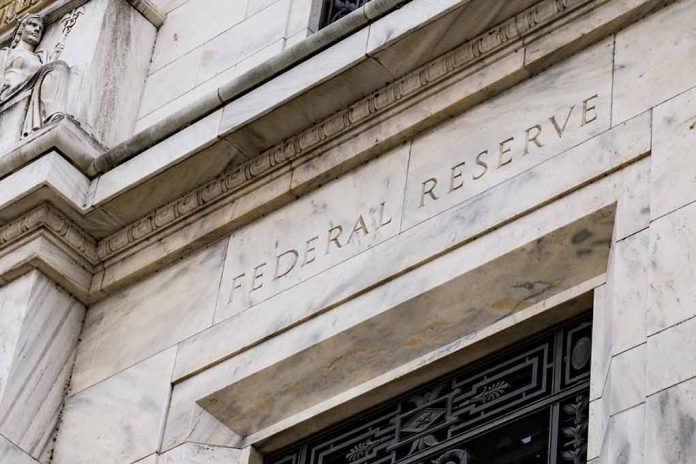
Federal Reserve Chairman Jerome Powell firmly states he won’t resign if asked by Trump, setting the stage for a potential clash between the central bank and the White House.
At a Glance
- Powell asserts he won’t resign if Trump asks, citing legal protections for Fed officials.
- Trump previously criticized Powell for raising interest rates, claiming economic harm.
- The Fed’s independence is crucial to prevent political interference in the economy.
- Powell’s term as Fed chair ends in mid-2026.
- Experts debate the extent of presidential power to remove Fed officials.
Powell’s Firm Stance on Independence
Federal Reserve Chairman Jerome Powell has made it clear that he will not step down from his position if asked by President-elect Donald Trump. This bold declaration comes amid speculation about the future relationship between the central bank and a potential Trump administration. Powell’s stance underscores the importance of the Federal Reserve’s independence from political pressures.
When directly questioned about the possibility of resigning at Trump’s request, Powell’s response was unequivocal: “No.” This single-word answer speaks volumes about the chairman’s commitment to maintaining the Fed’s autonomy. Powell further emphasized that the incoming president does not have the authority to fire him or other senior Fed leaders, citing legal protections designed to insulate the central bank from political interference.
Federal Reserve chair Jerome Powell says he will not resign before the end of his term, even if Trump asks him to leave. https://t.co/VFNiw81mH8
— Axios (@axios) November 7, 2024
A History of Tension
The relationship between Powell and Trump has been tumultuous since Powell’s appointment as Fed chair in 2018. Trump, known for his preference for low interest rates, frequently criticized Powell’s decisions to raise rates, accusing him of harming the economy. Despite this, Powell maintained that rate hikes were necessary to prevent inflation, a stance that put him at odds with the former president’s economic vision.
“I don’t think I should be allowed to order it, but I think I have the right to put in comments as to whether the interest rates should go up or down,” Trump said last month.
This comment from Trump highlights the tension between political desires and the Fed’s mandate to maintain economic stability. While presidents may have opinions on monetary policy, the Fed’s independence is designed to prevent short-term political goals from overriding long-term economic health.
The Importance of Fed Independence
Economists and financial experts argue that the Federal Reserve’s autonomy is critical. The ability to make decisions free from political pressure is seen as fundamental to the Fed’s role in managing the nation’s monetary policy and ensuring economic stability.
“The independence of the Fed is something that not just economists, or investors, but citizens should place a high value on,” economist Carl Tannenbaum said.
This sentiment echoes throughout the financial community, highlighting the broader implications of maintaining a clear separation between monetary policy and political influence. The Fed’s decisions affect everything from inflation rates to employment levels, making its independence crucial for long-term economic health.
Looking Ahead
As the political landscape shifts with the upcoming election, Powell has made it clear that the Fed’s focus remains on its mandated goals. “In the near term, the election will have no effects on our policy decisions,” Powell stated, emphasizing the Fed’s commitment to its core responsibilities regardless of political changes.
However, the potential for future conflicts looms. Trump’s previous criticisms and his expressed desire for low interest rates suggest that tensions could resurface if he returns to the White House. The Fed faces the challenge of balancing economic stability and inflation control amid growing fiscal debt and potential policy changes from a new administration.
Debates continue about the extent of presidential power over Fed officials and potential overhauls to the Fed’s governance structure. The coming years may test the resilience of the Fed’s independence, with implications that extend far beyond the terms of any single administration or Fed chair.
Sources
- Federal Reserve Chairman Jerome Powell says he will not resign if asked by Trump
- Fed’s Powell says Trump can’t fire him
- Forget a Soft Landing. The Fed’s Biggest Challenge May Be Trump.














